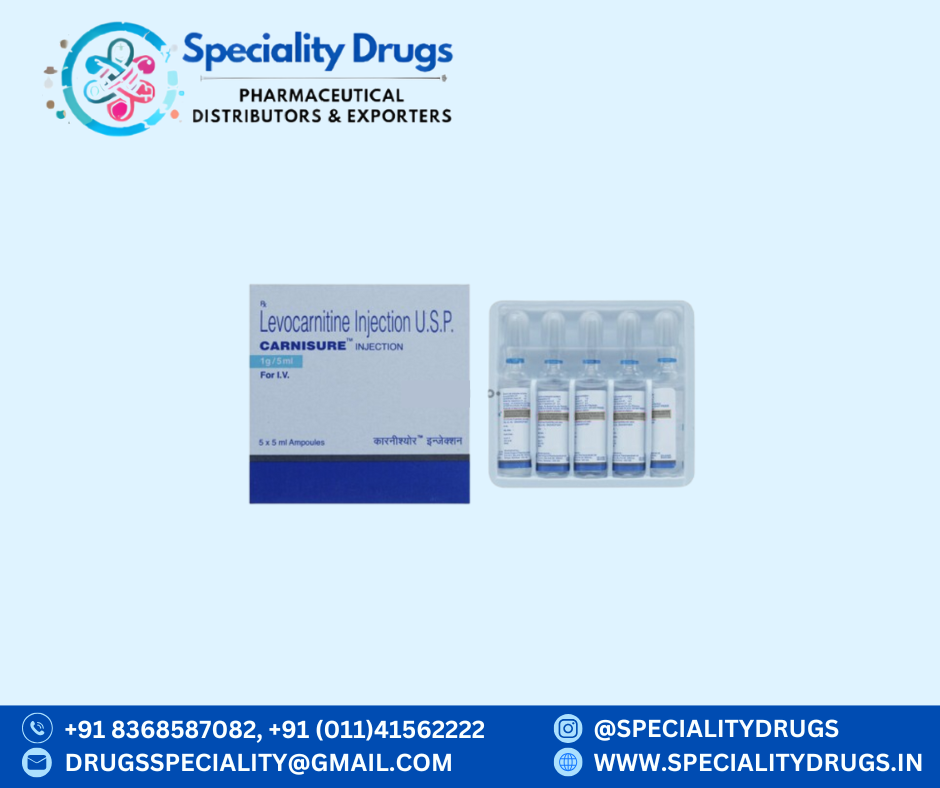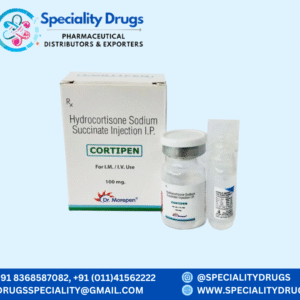What is Levocarnitine Injection U.S.P.?
Levocarnitine Injection U.S.P. is a sterile, injectable solution containing levocarnitine, a naturally occurring substance that plays a vital role in energy production within the body. It helps transport long-chain fatty acids into the mitochondria, where they are converted into energy. This medication is typically administered intravenously by healthcare professionals.
What is the use of Levocarnitine Injection U.S.P.?
Levocarnitine Injection is primarily used for:
-
Treatment of primary systemic carnitine deficiency, a rare genetic disorder where the body cannot produce enough carnitine.
-
Treatment and prevention of carnitine deficiency in patients with end-stage renal disease undergoing hemodialysis.
-
Supplementation in certain metabolic disorders that result in secondary carnitine deficiency.
Benefits of Levocarnitine Injection U.S.P.
-
Helps restore normal carnitine levels in the body.
-
Improves energy production and muscle function.
-
Reduces muscle weakness, fatigue, and low energy associated with carnitine deficiency.
-
Supports the management of metabolic disorders.
-
May improve exercise tolerance in patients with chronic kidney disease.
Side Effects of Levocarnitine Injection U.S.P.
While generally well-tolerated, some patients may experience:
-
Nausea or vomiting
-
Abdominal cramps
-
Diarrhea
-
Headache
-
Injection site reactions (redness, pain, swelling)
-
A fishy body odor (due to metabolic by-products)
In rare cases, allergic reactions such as rash, itching, dizziness, or breathing difficulties can occur. Always inform your doctor if you notice any unusual symptoms.
Important Information
-
This medicine should only be used under medical supervision.
-
Dosage and duration depend on individual patient needs and response.
-
Inform your doctor of all other medications you are taking to avoid interactions.
Levocarnitine Injection U.S.P.
-
What is Levocarnitine Injection U.S.P.?
It is a sterile injectable form of levocarnitine, a nutrient that helps your body produce energy by transporting fatty acids into cells. -
What conditions does Levocarnitine Injection treat?
It is used to treat and prevent carnitine deficiency, especially in patients with end-stage renal disease on dialysis or those with certain genetic metabolic disorders. -
How is Levocarnitine Injection administered?
It is usually given intravenously (into a vein) by a healthcare professional in a hospital or dialysis center. -
How often do I need to receive this injection?
The dosing schedule varies depending on your condition. For dialysis-related deficiency, it may be given after each dialysis session, typically 2–3 times per week. -
Can Levocarnitine Injection be used in children?
Yes, under medical supervision, it can be used in pediatric patients with confirmed carnitine deficiency. -
What are the benefits of using Levocarnitine Injection?
It helps improve energy levels, muscle strength, exercise tolerance, and overall well-being in patients with carnitine deficiency. -
Are there any side effects?
Some patients experience nausea, vomiting, diarrhea, abdominal cramps, or injection site reactions. Rarely, allergic reactions may occur. -
What should I do if I miss a dose?
Inform your healthcare provider. Doses are typically scheduled around dialysis, so your medical team will guide you on rescheduling. -
Is Levocarnitine Injection safe during pregnancy or breastfeeding?
Consult your doctor. Use during pregnancy and lactation should be carefully assessed by your healthcare provider. -
Can I take oral carnitine instead of the injection?
Oral and injectable forms are available. However, injections are preferred in certain conditions (e.g., severe deficiency or patients on dialysis) for better absorption. -
How long will I need this treatment?
Duration varies depending on your diagnosis and response to therapy. Some patients require long-term treatment. -
Can Levocarnitine Injection interact with other medications?
Yes. Always inform your doctor about all medicines, vitamins, or supplements you take to avoid potential interactions. -
What precautions should I take while on this treatment?
-
Follow your prescribed dose and schedule.
-
Report any unusual symptoms.
-
Attend all follow-up appointments to monitor your carnitine levels.
-
-
Will I experience a fishy body odor?
Some patients develop a mild fishy smell due to metabolic by-products. This is usually harmless but should be reported if it becomes bothersome. -
Where should Levocarnitine Injection be stored?
Storage is typically managed by healthcare facilities. If you are prescribed home administration, store it as directed (usually at controlled room temperature and protected from light).






Reviews
There are no reviews yet.